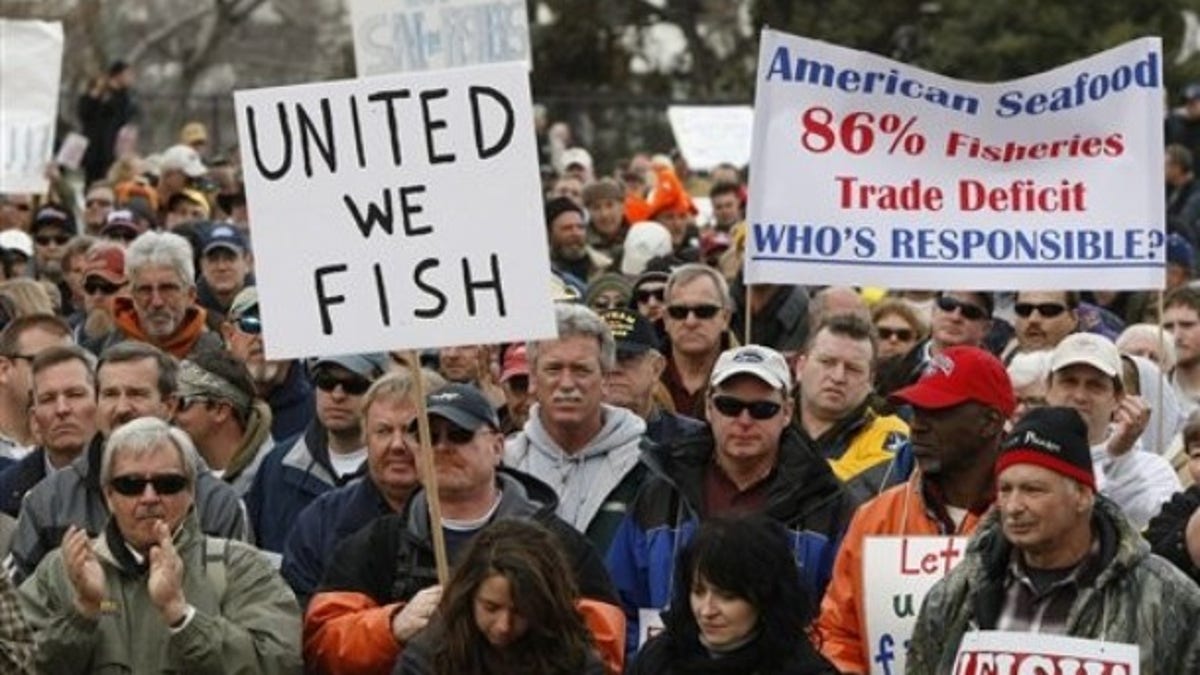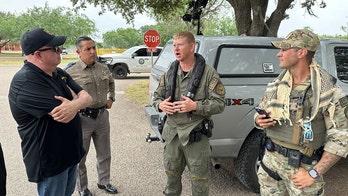
Feb. 24: Protesters gather at the United We Fish rally for recreational and commercial fishermen on Capitol Hill in Washington. (AP)
The White House is fighting back against fishing aficionados who say President Obama is planning to impose regulations that will give their hobby the hook.
Officials from at least eight fishing industry organizations say they have "serious questions and concerns" regarding a framework submitted by the Interagency Ocean Policy Task Force to plan and manage the uses of the nation's oceans, coastal areas and Great Lakes.
Some critics say the framework "threatens public access" to the nation's waters by using coastal and marine spatial planning (CMSP) as a euphemism for zoning -- a move they claim could restrict recreational fishing nationwide.
But it just isn't so, say officials from the White House Council on Environmental Quality. Nobody, they say, is trying to pry your rod and reel out of your hands.
"These draft reports are not map-drawing exercises, they do not contain a zoning plan and they do not establish any restrictions on recreational fishing or on public access, nor make any judgments about whether one ocean activity or use is better than another," Christine Glunz, spokeswoman for the Council on Environmental Quality, said in a statement to FoxNews.com on Wednesday.
Glunz said the task force "sincerely appreciates" the conservation efforts of recreational fishermen and women, and it believes their continued enjoyment of that activity is "critical to the economic, social and cultural fabric" of the United States.
"In fact, one of our main goals is to ensure healthier ocean, coasts and Great Lakes, which will benefit all recreational activities and the communities and economies that rely on them," Glunz wrote.
Obama established the Interagency Ocean Policy Task Force in June to address increasing pollution and habitat destruction within the nation's oceans, coastal regions and Great Lakes. Led by Nancy Sutley, the task force released an interim report in September that outlined nine priority objectives of the plan, including the coastal and marine spatial planning.
Three months later, in its interim framework, the task force defined that planning as an "effective process to better manage a range of social, economic, and cultural uses," including commercial and recreational fishing, mining, tourism and traditional hunting, among others.
But neither document contains language pertaining to a potential ban on recreational fishing, as some reports had previously asserted.
Fishing enthusiasts became alarmed when a story posted on ESPNOutdoors.com and widely circulated by bloggers alluded to the potential of a ban on recreational fishing. The Web site has since posted a clarification stating that columnist Robert Montgomery's opinion piece was improperly labeled.
Despite that clarification, recreational fishermen are reeling, fearing their rods are at risk.
Phil Morlock, director of environmental affairs for Shimano, an international manufacturer of fishing and cycling equipment, said recreational fishing stakeholders have made five detailed submissions to the Interagency Ocean Policy Task Force since July. Among their chief concerns, he said, is the impending policy's effect on an industry that contributes more than $125 billion to the nation’s economy annually and provides more than 1 million jobs nationwide.
"We certainly feel that should require a priority status," he said. "That hasn't happened yet. It might in the final report."
As the draft stands, Morlock claimed it "threatens public access to the nation's public waters" by using CMSP to implement a form of ocean zoning.
"We don't know it's going to work," Morlock continued. "The answers have not been forthcoming. The government owes all of us a very clear explanation and that hasn't happened yet."
Morlock urged fishermen to visit keepamericafishing.org to "make their voices heard" regarding the looming federal policy. The site enables users to send a letter to President Obama and top administration officials to view recreational fishing and boating as a priority in the report.
"As one of 60 million anglers in the United States, I urge you to ensure that recreational fishing is recognized and promoted as a distinct ocean, coastal and Great Lakes activity that has a significant impact on employment, the economy and the quality of life in this country," the letter reads.
Lance Lemmonds, spokesman for the Congressional Sportsmen's Association, said exactly what the policy document will mean to recreational fishing remains unclear.
"That's the million-dollar question," Lemmonds said. "There's no way of knowing what it'll be until this report comes out. But we're concerned about the feedback we've gotten about the final report about to be issued."




